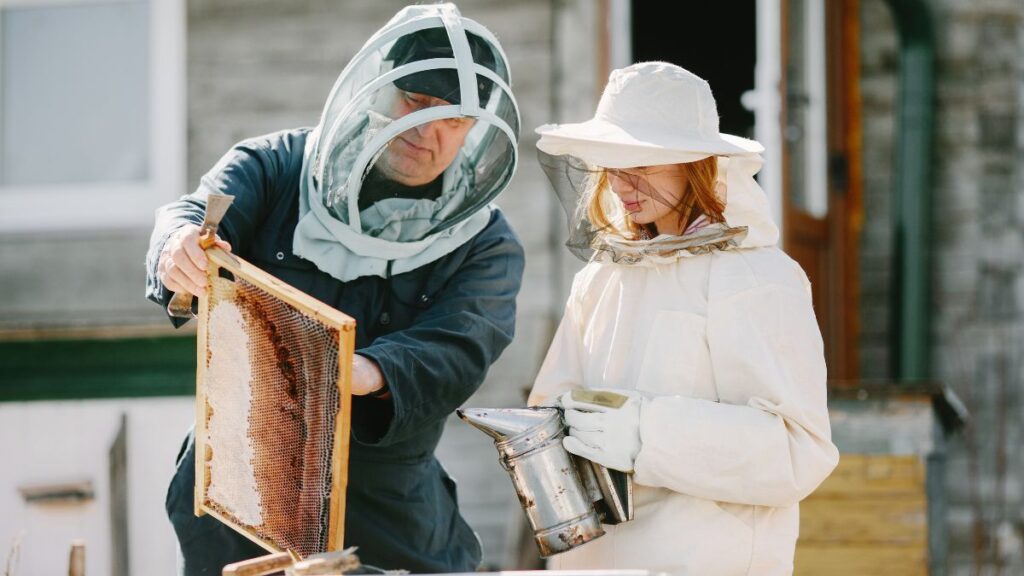For centuries, apiculture, or beekeeping, has been a vital component of agriculture, yielding honey and other hive products in addition to providing vital pollination services. However, in order to maintain and improve their methods, beekeepers are looking to creative solutions as the globe deals with environmental issues and the decline of pollinator populations. The “Bee Buddy,” a complex idea that combines community support, educational materials, and technological tools to revolutionize contemporary beekeeping, is one such solution.
The Development of Bee Buddy: A Comprehensive Strategy
The phrase “Bee Buddy” can refer to a number of programs and equipment intended to help beekeepers better manage their hives. These include everything from mobile apps and gadgets to community platforms and mentorship initiatives. The aim of all these projects is to increase beekeeping’s sustainability, efficiency, and accessibility.
Innovations in Technology: Bee Buddy Apps and Devices
Monitoring hive health, controlling pests, and effectively extracting honey are just a few of the many difficulties facing beekeeping today. Some of these issues have been resolved by technological advancements.
Devices for Bee Buds
Designed to make backyard beekeeping easier, the Bee Buddy device is a comprehensive inspection and extraction solution. It provides attributes like:
a) Safety and ergonomics : By removing the need for heavy lifting during hive inspections and honey extraction, the device lowers the possibility of accidents.
b) Efficiency : By streamlining the extraction procedure, it enables beekeepers to manage several frames at once.
c) Storage : By keeping honey airtight, the gadget shields it from impurities and maintains its quality.
Because of these characteristics, the Bee Buddy gadget is a useful tool for beekeepers of all skill levels.
Apps for Bee Buddy
Real-time monitoring of hive conditions, such as temperature, humidity, and bee activity, is possible with mobile applications like Bee Buddy. These applications assist beekeepers in making well-informed choices regarding the upkeep and management of their hives. These apps help hives become healthier and more productive by offering data-driven insights.
Community Assistance: Bee Buddy Mentorship Initiatives
For beekeepers, especially those who are new to the hobby, mentoring is essential to their development. Bee Buddy mentorship programs facilitate knowledge sharing and community building by pairing seasoned beekeepers with newcomers.
Association of Northern Colorado Beekeepers (NCBA)
Through its Bee Buddy program, the NCBA matches novice beekeepers with experienced mentors who help with different facets of hive management. Mentors offer advice on:
a) Inspections and upkeep of hives
b) Management of diseases and pests
c) Harvesting honey and providing seasonal care
This program makes sure new beekeepers have the resources they need to succeed and helps them integrate into the community.
Association of Merrimack Valley Beekeepers (MVBA)
The goal of the MVBA’s Bee Buddies program is to close the knowledge gap between classroom instruction and real-world experience. It links beekeepers past their first year with mentors who share experiences, inspect hives, and give advice. This program creates a nurturing atmosphere for ongoing education and development.
Learning Materials: Hive Buddy Community
a) For beekeepers of all skill levels, educational platforms such as Hive Buddy offer an abundance of resources. These platforms provide:
b) Online classes that cover a range of beekeeping topics
c) Availability of a beekeeping community for advice and experience sharing
Frequent workshops and webinars on hot topics in beekeeping
Platforms such as Hive Buddy improve beekeepers’ educational experience by centralizing information and encouraging community involvement.
The Value of Bees in Ecosystems and Agriculture
Pollination, which is necessary for the production of numerous crops and the preservation of biodiversity, is facilitated by bees. Around 35% of the world’s food crops and 75% of flowering plants rely on animal pollination, mostly by bees. Food security and the health of ecosystems are seriously threatened by the decline in bee populations.
Difficulties Beekeepers Face
A number of issues that beekeepers face can affect the productivity and well-being of their hives:
a) Management of Pests and Diseases: If left unchecked, varroa mites and other pests can destroy bee colonies.
b) Climate Change: Modified weather patterns have an impact on hive conditions and forage availability.
c) Colony Collapse Disorder (CCD): The abrupt demise of bee colonies brought on by a number of causes, such as habitat loss and pesticide exposure.
The beekeeping community must work together and find creative solutions to these problems.






